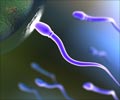As early as the mid-30s, women start to experience declines in fertility. Worm research finds that new drug may extend woman’s fertility by 6 years.

‘Novel drug that extends egg viability in worms has been identified. The new finding could potentially extend a woman's fertility by three to six years.’





"As early as the mid-30s, women start to experience declines in fertility, increased rates of miscarriage and maternal age-related birth defects. All of these problems are thought to be caused by declining egg quality, rather than a lack of eggs," Murphy added. The team used a microscopic worm, Caenorhabditis elegans (C.elegans), as they share many of the genes as humans, including longevity genes.
They found that a group of proteins called Cathepsin B proteases "downregulate", or lead to lower-quality oocytes (unfertilised eggs), as one ages.
In the study, published in the journal Current Biology, when the team administered the Cathepsin B inhibitor halfway through the worms' reproductive period, they found that even a late administration of the drug could extend the worms' egg quality.
Another experiment that knocked out the cathepsin B genes entirely succeeded in extending worms' fertility by about 10 per cent.
Advertisement
Reproductive decline is a hallmark of ageing, but despite its prevalence, interventions to slow the loss of reproductive capacity are lacking, researchers said.
Advertisement
Source-IANS














